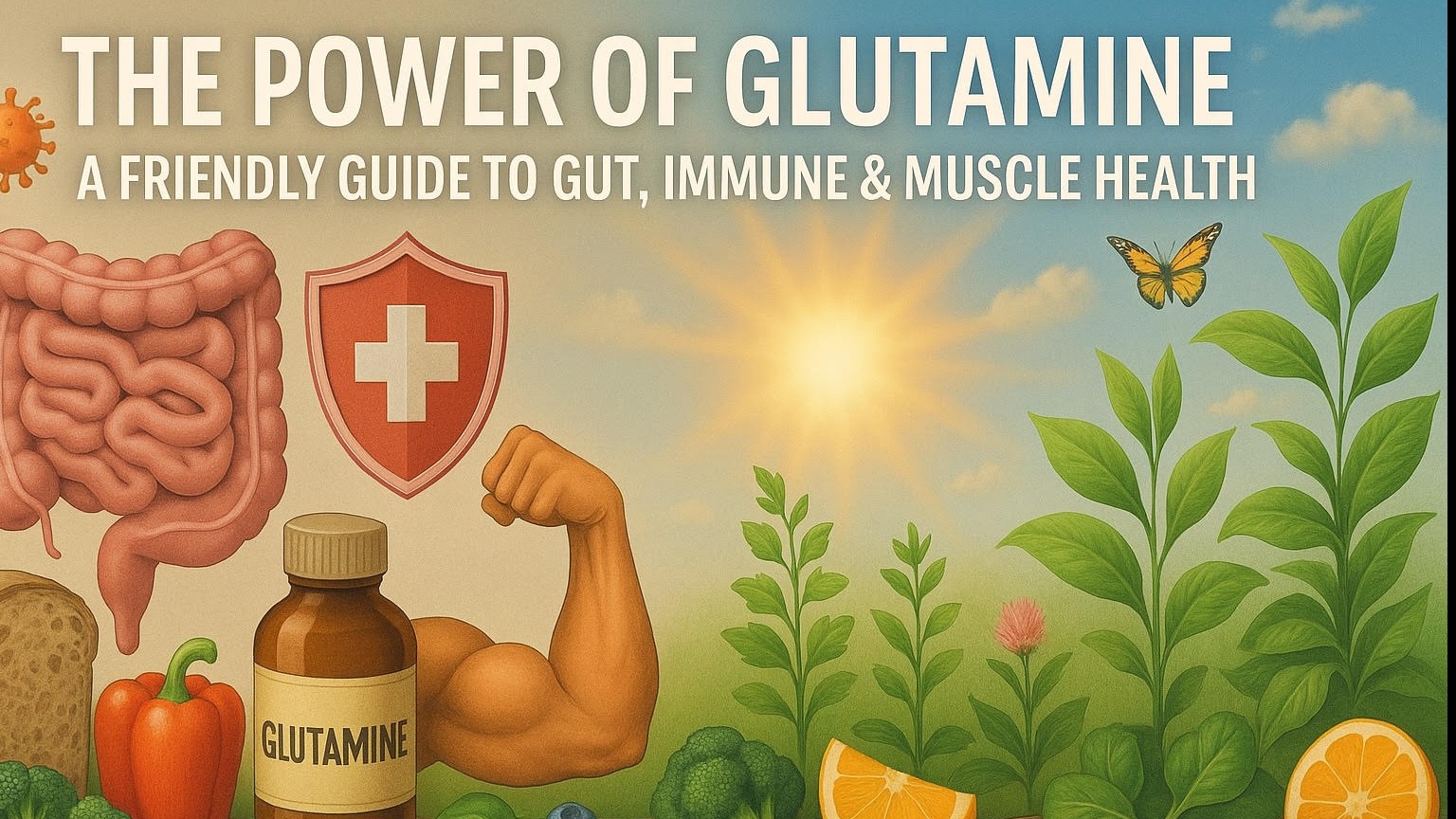
When it comes to nutrition and supplements, some nutrients get all the spotlight—like collagen, turmeric, or magnesium. But behind the scenes, there’s a quiet hero doing a lot of the heavy lifting: glutamine.
This amino acid might not be flashy, but it’s absolutely essential when your body is under stress—whether from illness, injury, intense exercise, or even poor gut health. In this blog, we’ll explore how glutamine works in the body, the science behind its benefits, and how to use it in real life to support your gut, immune system, and muscles.
🔬 What Exactly Is Glutamine?
Think of glutamine as a building block of protein. It’s one of 20 amino acids that help your body make the proteins it needs for everything from repairing muscles to keeping your immune system strong.
Most of the time, your body can make enough glutamine on its own. But when you’re sick, recovering from surgery, training hard, or dealing with chronic stress, your body might not keep up with demand. That’s when supplementation can really help.
There are two types of glutamine:
L-glutamine – This is the form your body uses and the one you’ll find in supplements.
D-glutamine – This exists in nature but isn’t useful for human health.
🌿 What Does Glutamine Actually Do for Us?
1. It Heals and Protects Your Gut
Your digestive tract is lined with millions of cells that are constantly regenerating. These cells rely on glutamine as their main source of energy. Without it, they can’t repair themselves properly, and that’s when issues like leaky gut, bloating, and inflammation show up.
In simple terms? Glutamine helps your gut lining stay strong and intact, so toxins, bacteria, and undigested food don’t "leak" into your bloodstream.
📚 Research-backed:
A study published in Nutrients (2020) showed that glutamine supplementation helped people with inflammatory bowel diseases like Crohn’s and ulcerative colitis reduce gut inflammation and improve the intestinal barrier (Nutrients. 2020;12(3):719).
Another review found that glutamine helped protect the gut in people undergoing chemotherapy—treatment that often damages the digestive tract (Curr Opin Clin Nutr Metab Care. 2017 Jul;20(4):369–374).
2. It Powers Up Your Immune System
Your immune cells—like white blood cells—use glutamine as fuel. When you're sick or stressed, they need more of it to keep working properly.
Glutamine also helps your body make glutathione, a powerful antioxidant that fights off harmful free radicals and supports detoxification.
📚 Research-backed:
A clinical trial in Clinical Nutrition (2013) showed that critically ill patients given glutamine had stronger immune responses and fewer infections (Clin Nutr. 2013;32(1):124-130).
And a fascinating study from 1996 found that marathon runners who took glutamine had fewer colds and infections after their races than those who didn’t supplement (Eur J Appl Physiol. 1996;73(5):488–90).
3. It Speeds Up Muscle Recovery and Reduces Soreness
If you’ve ever felt wrecked after a tough workout, glutamine might help you bounce back faster.
When you work out hard, especially during weight training or long cardio sessions, your glutamine levels drop. This can increase muscle soreness and slow down recovery. Supplementing with glutamine helps:
Reduce muscle breakdown
Replenish energy stores (called glycogen)
Boost recovery so you can train again sooner
📚 Research-backed:
A 2004 study found that athletes who took glutamine recovered strength faster after intense workouts (J Strength Cond Res. 2004;18(4):785-91).
Another study in Nutrition (2015) showed that glutamine helped improve exercise performance and reduced fatigue in weightlifters (Nutrition. 2015 Mar;31(3):344-9).
🎯 How to Use Glutamine for Real-Life Goals
✅ For Gut Repair
If you’re dealing with digestive issues—like bloating, IBS, food sensitivities, or recovering from antibiotics—glutamine can help heal and seal your gut lining.
Dose: 5 to 10 grams (1–2 teaspoons) twice daily
Best Time: On an empty stomach—morning and before bed
How to Take It: Mix powder into water or warm bone broth
Bonus: Combine with gut-soothing herbs like slippery elm or DGL licorice for extra healing
✅ For Immune Support
Glutamine is helpful during cold and flu season, or anytime your body is fighting off illness.
Dose: 5 grams once or twice a day during illness or high stress
Best Time: With meals
Pair With: Vitamin C, NAC (an amino acid), and selenium to support glutathione production
✅ For Muscle Recovery & Performance
Athletes and fitness lovers can benefit from glutamine to recover faster and stay strong during training.
Dose: 5–10 grams post-workout or before bed
How to Take It: Add to your protein shake or smoothie
Bonus Stack: Works great with magnesium, creatine, and collagen peptides
🥦 Natural Food Sources of Glutamine
While supplements give you a higher dose, you can also find glutamine in whole foods:
Grass-fed beef and chicken
Wild-caught fish
Eggs
Spinach and cabbage
Lentils and beans
Bone broth (a top gut healer!)
⚠️ A Few Precautions
Most people tolerate glutamine very well, but here’s when you should check with a doctor first:
Cancer patients: Some cancers can use glutamine for fuel—talk to your oncologist first.
Liver or kidney disease: Your doctor may need to monitor usage.
Pregnancy or breastfeeding: There’s limited research, so check with your provider.
🧠 Bottom Line
Glutamine might not be trendy, but it’s incredibly powerful.
It fuels your gut lining, strengthens your immune system, and helps your muscles recover—especially when life throws your body into stress mode. If you’re struggling with digestive issues, low immunity, or post-workout fatigue, glutamine could be the missing link.
With strong research backing and decades of safe clinical use, this amino acid deserves a place in your health and healing toolbox.
 Add Row
Add Row  Add
Add 










Write A Comment